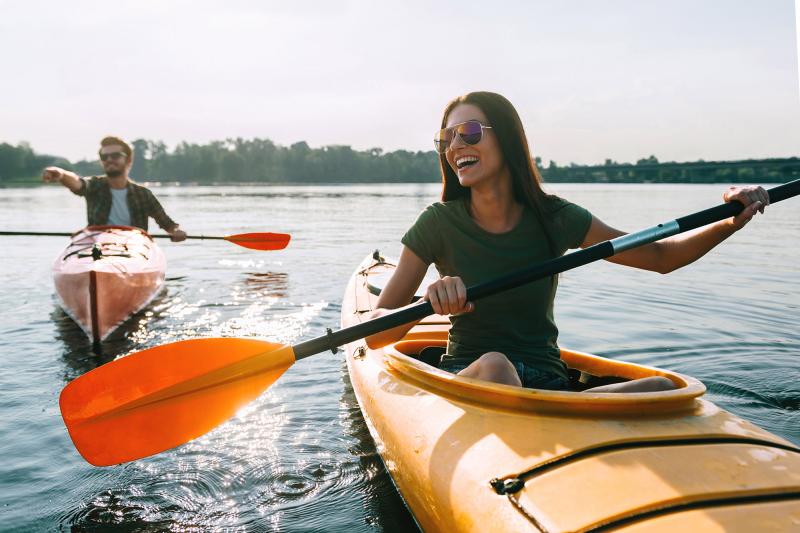- AdventHealth University

It’s summer! You’re probably ready to pack your bags and enjoy some much-needed rest and relaxation. Perhaps your summer plans have you headed to the beach or another sunny locale. Or, maybe you already live in an area that has plenty of sun and beaches (hello, Florida) and are looking forward to spending some more time outdoors.
While the sun can feel great on your skin and provide important Vitamin D, too much can cause long-lasting damage. Sun exposure is the leading cause of skin cancer1. It can also cause other skin issues, such as sun burns and wrinkles.
You don’t have to skip your beach trip or spend your entire summer trapped indoors, though. You just need to practice sun smarts to keep your skin safe.
How Much Sun is Too Much Sun?
It doesn’t take much time in the sun for damage to occur. Depending on your skin type, 15 minutes outdoors on a sunny day can be enough to cause skin damage2.
The strength of the sun’s ultraviolet rays determines how much damage the sun is likely to cause your skin. The UV index measures the amount of ultraviolet radiation that reaches the Earth. Factors such as the solar angle, how much sunshine there is, and how much ozone is in the atmosphere affect the UV index. The index starts at zero and can go up to infinity (although most places on Earth have UV index values under 12)3.
If the UV index is above 3, it’s usually recommended that you take measures to protect yourself from the sun. What’s a typical UV index value on a sunny day? On July 12, 2019, the UV index in Orlando, FL was 11, which the Environmental Protection Agency rates as “extreme4.” It recommends taking steps to reduce sun exposure between the hours of 10 am and 4 pm.
5 Things to Do to Shield Your Skin from the Sun
When you are outdoors, and the UV index is above 3, there are several things you can do to protect your skin:
- Cover up. Wear long pants and a long-sleeved shirt, if possible. Darker colors provide more protection against the sun’s UV rays than lighter colors2.
- Protect your eyes. A pair of sunglasses with UV protection will help to shield your eyes from the sun, reducing the risk of cataracts. Sunglasses can also protect the skin around your eyes.
- Wear a hat. A hat with a wide brim will keep the sun off your face and will also offer some protection for your ears and scalp.
- Seek shade. Try to stay in shaded areas when the sun is at its most intense. You might want to set up an umbrella on the beach to protect yourself or seek shelter under trees if you’re spending the afternoon in a park.
- Wear sunscreen. Apply a broad-spectrum sunscreen to all areas of exposed skin before heading outdoors. It’s a smart idea to wear sunscreen even when it’s cloudy outside.
How to Get Sunscreen Smart
How you apply sunscreen and how often you apply it can make a big difference when it comes to protecting your skin from the sun’s UV rays. You want to choose the right sunscreen and you want to get in the habit of using enough of it to get the best results.
First things first, look for a sunscreen that offers broad spectrum protection, which means that it protects against both UVA and UVB rays. Next, pay attention to the sun protection factor, aka SPF. The higher the SPF, the more protection the sunscreen uses. You’ll want to use one with an SPF of at least 152. Using a sunscreen with an SPF of at least 15 every day can reduce your skin cancer risk by up to 50%5.
You’ll most likely need to apply sunscreen multiple times throughout the day, especially if you’ll be outdoors for several hours. The general recommendation is to reapply it every two hours. If you’re sweating or swimming, you might want to reapply more frequently.
Can You Get a Safe Tan?
Some people believe that getting a tan offers some protection from the sun or that using a tanning bed is a “safe” option. The truth is that use of a tanning bed exposes you to the same UV rays that natural sunlight does. You’re better off skipping the tanning bed.
If you do want to get a tan, there are some safer options. You can try a sunless tanning product, either one that you apply yourself at home or a spray-on product applied by a professional. Sunless tanners usually contain DHA, which causes the skin to turn brown6. If you do end up trying out a sunless tanner, keep this in mind: Having a tan doesn’t offer extra sun protection. You’ll still want to wear sunscreen and cover up when you head outside, no matter how dark your tan is.
Even during the summer months, AHU Online’s counselors, academic advisors and tutors are available to provide support to our students. The benefit of online education is that you can take classes anywhere, on the go. So, get out of the sun, open your laptop and feel free to reach out today about our programs.
References:
- Have a Sun-Safe Summer, American Cancer Society, May 21, 2019, https://www.cancer.org/latest-news/stay-sun-safe-this-summer.html
- Sun Safety, Centers for Disease Control, June 24, 2019, https://www.cdc.gov/cancer/skin/basic_info/sun-safety.htm
- How Much Sun is Too Much Sun, BC Cancer, June 7, 2017, http://www.bccancer.bc.ca/about/news-stories/stories/how-much-sun-is-too-much-sun
- UV Index for Orlando, Fl., Environmental Protection Agency, accessed July 12, 2019, https://enviro.epa.gov/enviro/uv_search_v2?minx=-81.51438999999993&miny=28.401230000000055&maxx=-81.24038999999993&maxy=28.675230000000056
- The Skin Cancer Foundation Comments on Sunscreen Ingredient Absorption Study, Skin Cancer Foundation, May 7, 2019 https://www.skincancer.org/media-and-press/press-release-2019/sunscreen-ingredient-absorption
- Fake it to make it: Sunless tanning explained, Skin Cancer Foundation, August 29, 2017, https://blog.skincancer.org/2017/08/29/sunless-tanning-explained/


